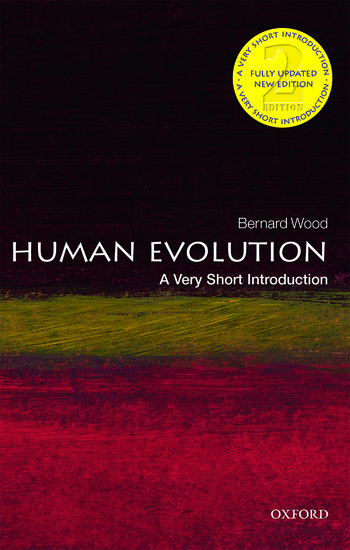Home >
A Very Short Introduction >
Human Evolution (2nd edition) (Science)
A Very Short Introduction | Science
Human Evolution (2nd edition)
ISBN: 9780198831747
Series: A Very Short Introduction
Human Evolution (2nd edition) (Science)
A Very Short Introduction Human Evolution (2nd edition) (Science) Media > Books > Non-Fiction > Education Books Expect Delays of Up to 4 Weeks| Order Below |
ISBN
9780198831747 (10-digit ISBN: 0198831749)
- Description
- Key Features
- Series Description
- Table of Contents
- Traces the history of paleoanthropology from its beginnings in the eighteenth century to the very latest fossil finds
- Explores how Ancient DNA studies have revolutionized how we view the recent (post-550 ka) human evolution
- Discusses discoveries of new taxa, as well as the suggestion from ancient DNA studies of 'ghost' taxa whose fossil records still remains to be discovered
- Explains how fossils are found, and analysed, and why they are interpreted in different ways
- Explains the functions of geochronology and paleoclimatology
The study of human evolution is advancing rapidly. Newly discovered fossil evidence is adding ever more pieces to the puzzle of our past, whilst revolutionary technological advances in the study of ancient DNA are completely reshaping theories of early human populations and migrations.
In this Very Short Introduction Bernard Wood traces the history of paleoanthropology from its beginnings in the eighteenth century to the very latest fossil finds. In this new edition he discusses how Ancient DNA studies have revolutionized how we view the recent (post-550 ka) human evolution, and the process of speciation. The combination of ancient and modern human DNA has contributed to discoveries of new taxa, as well as the suggestion of 'ghost' taxa whose fossil records still remain to be discovered. Considering the contributions of related sciences such as paleoclimatology, geochronology, systematics, genetics, and developmental biology, Wood explores our latest understandings of our own evolution.
Oxford's Very Short Introductions series offers concise and original introductions to a wide range of subjects--from Islam to Sociology, Politics to Classics, Literary Theory to History, and Archaeology to the Bible.
Not simply a textbook of definitions, each volume in this series provides trenchant and provocative--yet always balanced and complete--discussions of the central issues in a given discipline or field. Every Very Short Introduction gives a readable evolution of the subject in question, demonstrating how the subject has developed and how it has influenced society. Eventually, the series will encompass every major academic discipline, offering all students an accessible and abundant reference library.
Whatever the area of study that one deems important or appealing, whatever the topic that fascinates the general reader, the Very Short Introductions series has a handy and affordable guide that will likely prove indispensable.
Please note: As this series is not ELT material, these titles are not subject to discount.
1: Introduction
2: Finding our place
3: Fossil hominins: their discovery and context
4: Fossil hominins: analysis and interpretation
5: Early hominins: possible and probable
6: Archaic and transitional hominins
7: Pre-modern Homo
8: Modern Homo
Timeline of thought and science relevant to human origins and evolution
Further reading
Index
The study of human evolution is advancing rapidly. Newly discovered fossil evidence is adding ever more pieces to the puzzle of our past, whilst revolutionary technological advances in the study of ancient DNA are completely reshaping theories of early human populations and migrations.
In this Very Short Introduction Bernard Wood traces the history of paleoanthropology from its beginnings in the eighteenth century to the very latest fossil finds. In this new edition he discusses how Ancient DNA studies have revolutionized how we view the recent (post-550 ka) human evolution, and the process of speciation. The combination of ancient and modern human DNA has contributed to discoveries of new taxa, as well as the suggestion of 'ghost' taxa whose fossil records still remain to be discovered. Considering the contributions of related sciences such as paleoclimatology, geochronology, systematics, genetics, and developmental biology, Wood explores our latest understandings of our own evolution.
Key Features
- Traces the history of paleoanthropology from its beginnings in the eighteenth century to the very latest fossil finds
- Explores how Ancient DNA studies have revolutionized how we view the recent (post-550 ka) human evolution
- Discusses discoveries of new taxa, as well as the suggestion from ancient DNA studies of 'ghost' taxa whose fossil records still remains to be discovered
- Explains how fossils are found, and analysed, and why they are interpreted in different ways
- Explains the functions of geochronology and paleoclimatology
Series Description
Oxford's Very Short Introductions series offers concise and original introductions to a wide range of subjects--from Islam to Sociology, Politics to Classics, Literary Theory to History, and Archaeology to the Bible.
Not simply a textbook of definitions, each volume in this series provides trenchant and provocative--yet always balanced and complete--discussions of the central issues in a given discipline or field. Every Very Short Introduction gives a readable evolution of the subject in question, demonstrating how the subject has developed and how it has influenced society. Eventually, the series will encompass every major academic discipline, offering all students an accessible and abundant reference library.
Whatever the area of study that one deems important or appealing, whatever the topic that fascinates the general reader, the Very Short Introductions series has a handy and affordable guide that will likely prove indispensable.
Please note: As this series is not ELT material, these titles are not subject to discount.
EASY ORDER FORM
PRICES LISTED INCLUDE CONSUMPTION TAX
Price Before Tax:
¥1,790


